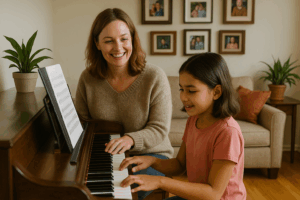Hello! I’m Anna, a piano teacher with Lessons In Your Home, and I’ve been asked many times: “Why do pianists teach?” For me, the answer centers on sharing discovery, building confidence, and helping beginners form a lifelong connection to music. When someone asks me why I teach piano, I’m happy to share that it’s about much more than notes—it’s about nurturing curiosity, focus, and joy.
My Story: From Curious Learner to Teacher
I started learning piano at age seven, encouraged by a patient teacher who showed me how music could feel alive. That experience shaped my teaching philosophy: lessons should be engaging, encouraging, and tailored to each student’s pace. Now, working with families through in-home lessons, I aim to create that same spark in my beginner students—whether they’re five or fifty.
What I Teach Beyond the Keys
1. Musical Foundations and Technique
- Basic posture and hand position
- Understanding rhythm and timing with comfortable practice strategies
- Simple pieces that emphasize confidence more than perfection
2. Growing Musicianship and Reading Skills
- Gradual introduction to reading notation and charting familiar chords
- Ear training: matching pitch, rhythmic clapping, recognizing intervals
- How reading supports improvisation and pattern recognition over time
Check out our guide on how chord charts reinforce note-reading in our post on Four Easy Steps to Reading Chord Charts.
3. Encouraging Practice Habits
- Short daily sessions—10–15 minutes—that build routine
- Reflection: What felt enjoyable today? What was challenging?
- Positive reinforcement: Every step forward is celebrated
4. Confidence, Creativity, and Performance Skills
Teaching isn’t just about playing accurately—it’s about feeling comfortable expressing yourself. I work with students to:
- Practice small performances for family or friends
- Use visualization and relaxation strategies before playing
- Explore short improvisations to build creative freedom
According to a study by the Royal Conservatory of Music, piano study at a young age is directly linked to better memory, spatial awareness, and emotional regulation—skills that support growth far beyond music.
Why I Believe Beginners Benefit Most
When students begin piano lessons at home with one-on-one focus, they gain clarity and momentum. Here’s what I consistently see:
- Faster progress in note recognition and rhythm
- Greater self-discipline and motivation
- Increased joy in practice rather than feeling overwhelmed
FAQ – Teacher Anna’s Tips
Q: Can beginners start piano as adults?
A: Absolutely. I’ve taught many adult beginners who flourish because they’re learning from choice—not obligation.
Q: How long until a student plays a song confidently?
A: Typically within a month or two, students can perform a simple piece or melody with confidence—especially when they see success early.
Q: How do lessons at home differ from studio lessons?
A: In-home lessons offer comfort, personalization, and ease. Students practice in familiar environments, and families can stay more engaged in the process.

